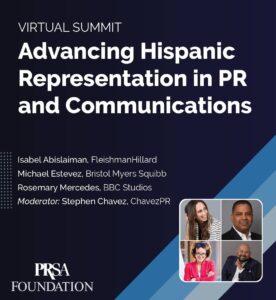“It’s important for our clients, for the companies we work with, to make sure we’re authentic in our storytelling, and that we understand our audiences and how we can better connect with them,” Stephen Chavez said.
Chavez, president of ChavezPR, a certified LGBT Business Enterprise, is a board member of the PRSA Foundation and sits on the PRSA DEI Committee. He moderated an Oct. 8 virtual panel discussion titled “Advancing Hispanic Representation in PR and Communications,” held in partnership with PRSA’s DEI Committee and its PRSA Hispanic-Latino Affinity Group as part of Hispanic Heritage Month.

“I’m thinking about the team leaders out there, the CEOs, the agency leads who are looking at hiring, and why they should consider hiring more Hispanics,” Chavez said. How will doing so affect “storytelling, messaging and media relations, getting the reach you’re looking for, as you’re telling those stories?”
In response, panelist Isabel Abislaiman said, “If I had to choose one word, it would probably be because it’s transformative.” Hiring more Hispanics “transforms all those things, whether it’s the storytelling, the messaging, the media relations,” said Abislaiman, senior vice president and senior partner at FleishmanHillard.
“When you’re crafting a narrative, how do you know [it’s] going to resonate if you don’t bring that diverse perspective, amongst the whole team?” she said. “Having those diverse perspectives, including the Hispanic perspective, boosts relevance.”
Continuing to open doors
Chavez asked what can be done to encourage more Hispanics to pursue careers in public relations.
“I don’t think there’s a silver bullet that’s going to do it,” said panelist Rosemary Mercedes, a firstborn American daughter of Dominican immigrants, who is now senior vice president of communications for BBC Studios in New York. “It’s easy to think that the boss, the person at the top, has to be out there more. But I think that at every stage, we advocates and be out there… early career, mid-level and senior.”
Mercedes said she stays connected with her alma mater, Seton Hall University, and mentors students in its Honors Communications program.
“This summer, I had a rock star of an intern, a young Latina,” she said. “I opened a door that led to amazing opportunities for her development. All I ask is she continue to open doors for others. We need to do that, not just the senior person, but every single person.”
To encourage young Hispanics to enter the PR and communications profession, “Make sure that you open the doors for the next generation coming up,” said panelist Michael Estevez, vice president of communications at Bristol Myers Squibb. “I encourage college students and young professionals to go looking for doors and [to] knock on doors. LinkedIn puts the world at your fingertips. Connect with folks like Rosemary, folks like Isabel.”
Chavez, who is an adjunct professor at the University of La Verne in California, said he’s “always telling students about the importance of getting out there.” Today’s college students came of age during the COVID years, when organizations went virtual, but “now you’re seeing a lot more in-person events. There’s no better way to make connections than in-person, to have that eye-to-eye contact, to shake that hand and to get their card, and then to follow up with them.”
Overcoming barriers
Chavez asked the panelists if they had faced discrimination in their careers.
“I’m sure there were barriers,” Estevez said, “but I couldn’t tell you what they were, because I didn’t pay attention to it. My advice to young Latinos is that if you look for racial barriers, you’re going to find them. But we have much more representation in our profession than we did before.”
When he was growing up, his father told him, “‘Never use your ethnicity as an excuse for why you didn’t succeed,’” Estevez said. But then his father would add, “You need to be three times better than everyone else, because you’re Hispanic. Be so good that you can’t be ignored.”
Estevez advised Hispanic PR practitioners “to reach out to people and let them know that this profession even exists, and to look for it. Prompt employers to do outreach to high school and college students. There’s a real role for our community in this profession, but it can only grow if people know about it.”
In her career, “The biases were absolutely there,” said Mercedes, who, before becoming a communications executive at BBC Studios, worked in public relations at Univision for 15 years, after working for a PR firm in Scotland early in her career and in other communications roles. “But I used that as fuel to propel me forward, not as something to hold me back.”
Mercedes urges young Latino job seekers in PR not to make assumptions about other people. “When people make assumptions about you, we might have the tendency to return the favor and make assumptions” about them, she said.
In today’s climate, Chavez said, “you’re seeing attacks against DEI, for example, during the election, when people said ‘She was a DEI hire,’ as if it was a bad thing. How important are allies in increasing the number of Hispanics in PR?”
In Mercedes’ view, “allies have to walk the talk and be proactive. ‘Allyship’ is an action word. What are you doing to advance things? Are you tapping somebody on the shoulder? What time are you dedicating in numbers and minutes and hours, and how many weeks and months? You have to hold yourself to account, and others to account, to deliver that.”
At BBC Studios, “My team is the most diverse that we have in the region,” Mercedes said. “And that, to me, is a badge of honor. You want the right set of people who can help you see around corners because you want to win. It’s about winning.”
Watch a playback of the session here.
PRSA is pleased to unveil the 2025 Hispanic Heritage Month Toolkit, “A Communications Guide to Centering Impact.” PRSA designed this resource to assist communications professionals in celebrating with authenticity, respect and effectiveness. The toolkit offers storytelling frameworks, activation ideas, language and engagement strategies, and curated resources to recognize the diverse contributions of Hispanic and Latino communities. Access the toolkit on the PRSA website.
Photo credit: studio romantic







